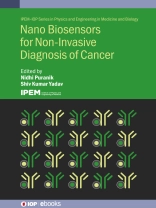This book includes the most up-to-date point-of-care cancer detection technologies and processes, which are based on biomedical sensors, microfluidics and integrated systems engineering. It compiles detailed literature on various novel applications of nano biosensors in cancer diagnosis by primarily focusing on non-invasive biomarker detection, use of nanoparticles, and biosensor applications. It also includes current advancements and diagnostic tests that can be conducted outside of the laboratory in remote areas. Electrochemical sensors, paper-based microfluidics, and other kit-based diagnostic techniques are just a few of the technologies that can be tweaked to bring cancer detection and diagnosis to more remote parts of the globe. This book is an ideal resource for researchers in the fields of nanotechnology, nanobiotechnology, and medical studies.
Key Features:
- Covers in detail the Role of nano biosensors for early detection of cancer
- Clinical use of nanoparticles in biosensor development is incorporated where useful
- Importance of non-invasive biomarkers for the detection of cancer is stressed
- The utility of nano biosensors in cancer diagnosis is covered particularly from a third-world perspective
- Extensive references included to enhance further study
Mục lục
Preface
Acknowledgements
Editor biographies
List of contributors
1 Cancer: an overview of its development, progression, detection and diagnosis
2 Imaging techniques in current biosensor advancements in cancer diagnosis
3 Invasive techniques and their challenges in the early detection of cancer
4 Insights into noninvasive approaches for the early detection of cancer with a special focus on nanodiagnostics
5 Detection of circulatory cancerous cells for early diagnosis of breast cancer
6 Insight into the role of non-coding RNA as a potential biomarker for the early detection of breast cancer
7 Insight into the role of non-coding RNAs as potential biomarkers for the early detection of lung cancer
8 Emerging studies on the detection of cancer-associated exosomal bodies for the early diagnosis of cancer
9 Nanosensors: an overview of future utility in the biomedical domain
10 The fabrication of various nanobiosensors for the early diagnosis of cancer
11 Paper-based point of care diagnostic systems for cancer
12 Utility of various types of nanoparticles as potential materials for biosensors
13 Nanobiosensor based rapid detection of circulating biomarkers of cancer
14 Challenges in the development of nanobiosensors in the diagnosis of cancer
Giới thiệu về tác giả
Dr. Nidhi Puranik is a Research Assistant Professor in the Department of Life Science at Yeungnam University in Gyeongsan, South Korea. She did her Ph.D. at Defence Research & Development Establishment-DRDO (Research Center) and her degree was awarded from Bharathair University, Coimbatore, Tamil Nadu, India. Dr. Puranik has received numerous accolades, including the prestigious GATE, CSIR-NET, ICAR-NET, DRDO Junior Research Fellowship, MPCST Young Scientist Award, MPCST Young Scientist Training Fellowship (National), and the Young Investigator Award (International). She has contributed to esteemed institutions such as ICMR-NIREH, Bhopal; ICAR-IISR, Indore; Jiwaji University, Gwalior; and Barkatullah University, Bhopal. Her research contributions include over 40 highly cited research articles, one Indian patent, and five edited books published by IOP (three), Springer (two in press), and CRC Press (in press).
Dr. Shiv Kumar Yadav is an Assistant Professor at Government Lal Bahadur Shastri P.G. College in Madhya Pradesh, India. With over eight years of R&D experience, his expertise lies in the development of nanobiosensors for disease diagnostics, often collaborating with Dr. Nidhi Puranik. He has earned numerous accolades, including the prestigious GATE, CSIR-NET, UGC-NET, and ICMR-JRF qualifications. Additionally, he has received international travel grants on three occasions to present his work at esteemed international conferences. Dr. Yadav’s current research focuses on advancing immunological diagnostics and innovative approaches for cancer detection.












